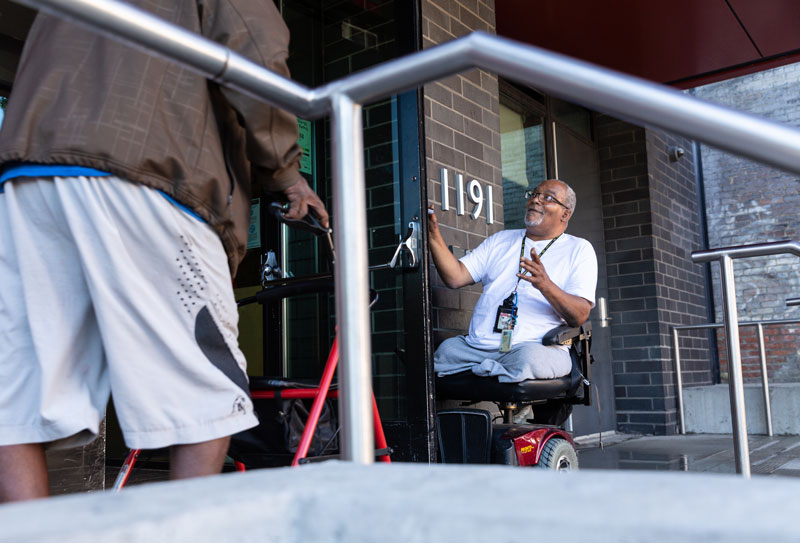
Homelessness is not a new issue, but in recent months a confluence of rising housing costs, increased immigration, and economic stagnation have severely strained the existing support system. An increasingly visible humanitarian crisis, homelessness in the city has dominated media headlines, with over 60,000 New Yorkers sleeping in shelters each night, and another 4,000 on the streets. The number of children, families, and individuals experiencing homelessness in our neighboring communities in Westchester and Long Island is also on the rise.
The population of those without stable, permanent housing is not monolithic—it includes individuals, parents, children, teenagers, LGBTQ people, older adults, veterans, and immigrants. Many grapple with complex and interrelated challenges that can include poverty, behavioral health issues, or domestic violence. The nonprofits below lead a range of interventions in permanent and supportive housing development; better services, including health and behavioral health care, for at-risk populations; and advocacy for policies and systems that help, not hinder, unhoused families and individuals seeking care and resources. Consider making a grant to these nonprofits and help your fellow New Yorkers get into a home, access support, and work toward long-term stability.
HOUSING
Supportive housing—affordable housing with on-site social services—can provide extra stability to people, especially those with mental illness and/or substance use disorders. But developing and managing supportive housing is difficult due to land use regulations, the mix of capital needed for development and operations, and an arduous approval process involving multiple government agencies.
With 30 years of expertise, Breaking Ground is the city’s largest developer and operator of supportive housing. It also runs a street outreach program that reaches thousands of people in Brooklyn, Queens, and Midtown Manhattan every year. To meet the need, it is increasing its housing capacity by 50 percent over the next few years through projects like the conversion of the Paramount Hotel to supportive housing.
Urban Pathways serves individuals through street outreach, a drop-in center, transitional housing, and permanent supportive housing. It is distinguished by its client-centered approach; smaller building sizes that foster a welcoming, safe environment; and comprehensive case management, health, and social services that it provides to transitional and permanent supportive housing residents.
Wyandanch Homes and Property Development Corporation develops affordable housing for families experiencing homelessness in Suffolk County, Long Island, and provides supports including financial workshops and academic and work coaching to help families achieve long-term stability.
SPECIALIZED SUPPORT SERVICES
New Yorkers with a history of mental health issues, substance use challenges, and domestic violence are at heightened risk of becoming unhoused. While programs are available to help them access behavioral health care services, enrollment is often low due to mistrust and administrative barriers. Families who have experienced domestic violence may struggle to access support services to help them process the trauma they and their children have survived, and work toward overall mental, physical, and financial well-being.
Coordinated Behavioral Care creates a continuum of care for individuals who have related physical health, mental health, substance use, and housing needs. One of its central tenets is that housing is essential to health. It coordinates intensive outreach to adults experiencing homelessness, connects them to support services, and helps people apply for and move from transitional shelters into supportive housing quickly, reducing the risk that they exit the shelter system without any support.
Comunilife is a multi-service agency with 2,700 units of supportive housing, serving a majority Black and Latinx client base. It recently launched an intensive case management program to engage and enroll unhoused New Yorkers with chronic health and behavioral health problems in Medicaid programs to which they are entitled, helping them avoid unnecessary hospitalizations and access comprehensive care.
New Destiny Housing develops housing and programs designed to meet the needs of unhoused families and survivors of domestic violence. It builds and manages permanent affordable housing, connects domestic violence survivors to other housing resources, and provides on-site services including mental health counseling, child therapy, financial education workshops, job training, and benefits management.
POLICY AND ADVOCACY
Advocates continue to push for humane, cost-effective policy solutions to New York’s homelessness crisis through research, litigation, and public education. They fight to make sure that elected officials keep campaign promises for affordable housing, that New Yorkers without homes can access legal aid and combat discrimination, and that sensible, fiscally sound solutions are part of the policy agenda.
Coalition for the Homeless is the oldest advocacy organization in the nation serving homeless individuals and families. It is the court-appointed monitor of the shelter system for single adults in New York City; has won a string of legal victories including the right to vote for Americans without homes; provides direct outreach and services; and is a leader on current trends and research-backed solutions, issuing a widely distributed annual report on the state of homelessness in the city each year.
Community Voices Heard is a member-led advocacy organization founded by and principally composed of women of color and low-income families. With branches in New York City, Westchester, Poughkeepsie and Newburgh, it fights for economic and racial justice with an emphasis on affordable housing and homelessness prevention, job creation, and voter outreach.
Neighbors Together mobilizes residents in Ocean Hill, Brownsville, and Bedford-Stuyvesant in Brooklyn to advocate to reduce homelessness, housing instability, hunger, and poverty in their communities. It is partnering with Legal Aid Society and Community Service Society of New York to streamline the burdensome application process for the city’s rental assistance program for at-risk families; reduce discrimination by landlords against families using rental assistance; and advocate for expanded eligibility and funding for rental assistance programs.
This list is not exhaustive. There are many incredible nonprofits helping make our city a better place for all; we seek to highlight a few that may not be on your radar, but please reach out to our philanthropic advising department at info@nyct-cfi.org if you would like even more recommendations tailored to your charitable goals.